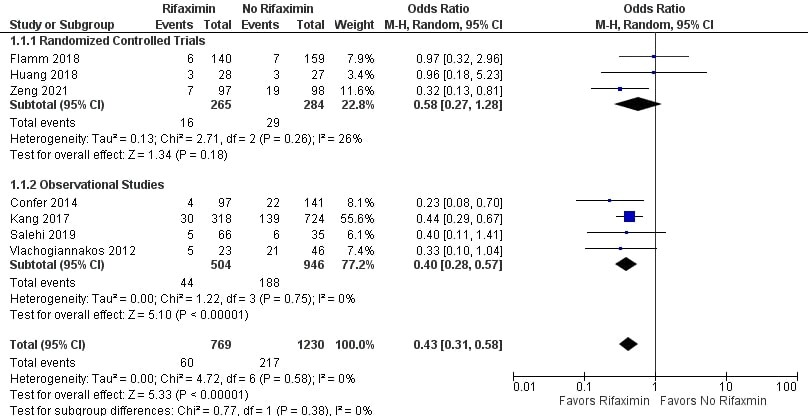Back
Poster Session D - Tuesday Morning
Category: Liver
D0473 - Role of Rifaximin in the Prevention of Acute Variceal Bleeding in Cirrhosis: A Systematic Review and Meta-Analysis
Tuesday, October 25, 2022
10:00 AM – 12:00 PM ET
Location: Crown Ballroom

Umair Iqbal, MD, CNSC
Geisinger Medical Center
Danville, Pennsylvania
Presenting Author(s)
Umair Iqbal, MD, CNSC1, Zohaib Ahmed, MD, MPH2, Mona Hassan, MD3, Muhammad Aziz, MD4, Hafsa Anwar, MD5, Syeda F. Arif, 2, Wade M. Lee-Smith, MLS2, Ali Nawras, MD2, Bradley D. Confer, DO1
1Geisinger Medical Center, Danville, PA; 2University of Toledo, Toledo, OH; 3University of Toledo, Holland, OH; 4The University of Toledo Medical Center, Toledo, OH; 5Capital Health Regional Medical Center, Hamilton, NJ
Introduction: Acute variceal bleeding is one of the most severe complications of cirrhosis and is associated with high mortality. Rifaximin has been shown to be efficacious in the treatment of hepatic encephalopathy (HE). Some studies have also shown rifaximin to be beneficial in decreasing the risk of initial episode of variceal bleeding and to decrease the risk of re-bleeding in those with prior variceal hemorrhage. We performed a systematic review and meta-analysis to evaluate the efficacy of rifaximin in prevention of acute variceal bleeding.
Methods: A systematic literature search was performed at PubMed, Embase, Web of Science and Cochrane library database until March 2022. All studies that evaluated the role of rifaximin in prevention of initial episode of variceal bleeding or risk of re-bleeding in cirrhotic patients were included in the meta-analysis. The analysis was performed using Revman 5.4 software.
Results: Seven studies including 1999 patients were included in the final meta-analysis. Of these, 3 studies were randomized controlled trials (RCTs) and 4 studies were observational studies. Out of 1999 included patients, 769 patients received rifaximin along with standard care management and 1230 patients received standard of care management only. Patients in the rifaximin group had significantly lower odds of acute variceal bleeding with OR= 0.43 (95% CI: 0.31, 0.58), I2=0. We also performed a subgroup analysis including only RCTs, which although showed trend toward lower risk of variceal bleeding in rifaximin group but did not reach statistically significance OR=0.58 (0.27, 1.28). In a second subgroup analysis, patients who received rifaximin also had significantly lower odds of spontaneous bacterial peritonitis (SBP) OR= 0.15 (0.10, 0.22), risk of acute kidney injury/hepatorenal syndrome (AKI/HRS) OR=0.39 (0.22, 0.68) and HE OR=0.37 (0.21, 0.68). Publication bias was deferred as number of studies were less than 10.
Discussion: Rifaximin is associated with lower odds of variceal bleeding, SBP, AKI/HRS and HE in patients with cirrhosis. Although the overall analysis demonstrates rifxamin can decrease the risk of variceal bleeding this loses statistical significance when only RCTs were included in the analysis. Therefore, additional RCTs are needed to further evaluate if there is any benefit of rifaximin in reducing the risk of variceal bleeding and to justify its use aside from the treatment HE.

Disclosures:
Umair Iqbal, MD, CNSC1, Zohaib Ahmed, MD, MPH2, Mona Hassan, MD3, Muhammad Aziz, MD4, Hafsa Anwar, MD5, Syeda F. Arif, 2, Wade M. Lee-Smith, MLS2, Ali Nawras, MD2, Bradley D. Confer, DO1. D0473 - Role of Rifaximin in the Prevention of Acute Variceal Bleeding in Cirrhosis: A Systematic Review and Meta-Analysis, ACG 2022 Annual Scientific Meeting Abstracts. Charlotte, NC: American College of Gastroenterology.
1Geisinger Medical Center, Danville, PA; 2University of Toledo, Toledo, OH; 3University of Toledo, Holland, OH; 4The University of Toledo Medical Center, Toledo, OH; 5Capital Health Regional Medical Center, Hamilton, NJ
Introduction: Acute variceal bleeding is one of the most severe complications of cirrhosis and is associated with high mortality. Rifaximin has been shown to be efficacious in the treatment of hepatic encephalopathy (HE). Some studies have also shown rifaximin to be beneficial in decreasing the risk of initial episode of variceal bleeding and to decrease the risk of re-bleeding in those with prior variceal hemorrhage. We performed a systematic review and meta-analysis to evaluate the efficacy of rifaximin in prevention of acute variceal bleeding.
Methods: A systematic literature search was performed at PubMed, Embase, Web of Science and Cochrane library database until March 2022. All studies that evaluated the role of rifaximin in prevention of initial episode of variceal bleeding or risk of re-bleeding in cirrhotic patients were included in the meta-analysis. The analysis was performed using Revman 5.4 software.
Results: Seven studies including 1999 patients were included in the final meta-analysis. Of these, 3 studies were randomized controlled trials (RCTs) and 4 studies were observational studies. Out of 1999 included patients, 769 patients received rifaximin along with standard care management and 1230 patients received standard of care management only. Patients in the rifaximin group had significantly lower odds of acute variceal bleeding with OR= 0.43 (95% CI: 0.31, 0.58), I2=0. We also performed a subgroup analysis including only RCTs, which although showed trend toward lower risk of variceal bleeding in rifaximin group but did not reach statistically significance OR=0.58 (0.27, 1.28). In a second subgroup analysis, patients who received rifaximin also had significantly lower odds of spontaneous bacterial peritonitis (SBP) OR= 0.15 (0.10, 0.22), risk of acute kidney injury/hepatorenal syndrome (AKI/HRS) OR=0.39 (0.22, 0.68) and HE OR=0.37 (0.21, 0.68). Publication bias was deferred as number of studies were less than 10.
Discussion: Rifaximin is associated with lower odds of variceal bleeding, SBP, AKI/HRS and HE in patients with cirrhosis. Although the overall analysis demonstrates rifxamin can decrease the risk of variceal bleeding this loses statistical significance when only RCTs were included in the analysis. Therefore, additional RCTs are needed to further evaluate if there is any benefit of rifaximin in reducing the risk of variceal bleeding and to justify its use aside from the treatment HE.

Figure: Figure 1: Forest plot for variceal bleeding
Disclosures:
Umair Iqbal indicated no relevant financial relationships.
Zohaib Ahmed indicated no relevant financial relationships.
Mona Hassan indicated no relevant financial relationships.
Muhammad Aziz indicated no relevant financial relationships.
Hafsa Anwar indicated no relevant financial relationships.
Syeda Arif indicated no relevant financial relationships.
Wade Lee-Smith indicated no relevant financial relationships.
Ali Nawras indicated no relevant financial relationships.
Bradley Confer indicated no relevant financial relationships.
Umair Iqbal, MD, CNSC1, Zohaib Ahmed, MD, MPH2, Mona Hassan, MD3, Muhammad Aziz, MD4, Hafsa Anwar, MD5, Syeda F. Arif, 2, Wade M. Lee-Smith, MLS2, Ali Nawras, MD2, Bradley D. Confer, DO1. D0473 - Role of Rifaximin in the Prevention of Acute Variceal Bleeding in Cirrhosis: A Systematic Review and Meta-Analysis, ACG 2022 Annual Scientific Meeting Abstracts. Charlotte, NC: American College of Gastroenterology.
